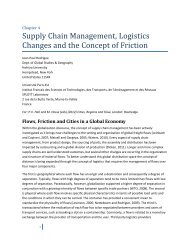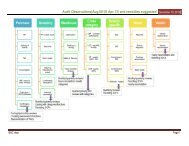handbook-on-corporate-social-responsibility-in-india
You also want an ePaper? Increase the reach of your titles
YUMPU automatically turns print PDFs into web optimized ePapers that Google loves.
What is CSR?<br />
The global c<strong>on</strong>text<br />
While there may be no s<strong>in</strong>gle universally<br />
accepted def<strong>in</strong>iti<strong>on</strong> of CSR, each def<strong>in</strong>iti<strong>on</strong><br />
that currently exists underp<strong>in</strong>s the impact<br />
that bus<strong>in</strong>esses have <strong>on</strong> society at large and<br />
the societal expectati<strong>on</strong>s of them. Although<br />
the roots of CSR lie <strong>in</strong> philanthropic<br />
activities (such as d<strong>on</strong>ati<strong>on</strong>s, charity,<br />
relief work, etc.) of corporati<strong>on</strong>s, globally,<br />
the c<strong>on</strong>cept of CSR has evolved and now<br />
encompasses all related c<strong>on</strong>cepts such as<br />
triple bottom l<strong>in</strong>e, <strong>corporate</strong> citizenship,<br />
philanthropy, strategic philanthropy, shared<br />
value, <strong>corporate</strong> susta<strong>in</strong>ability and bus<strong>in</strong>ess<br />
resp<strong>on</strong>sibility. This is evident <strong>in</strong> some of the<br />
def<strong>in</strong>iti<strong>on</strong>s presented below:<br />
The EC 1 def<strong>in</strong>es CSR as “the resp<strong>on</strong>sibility of<br />
enterprises for their impacts <strong>on</strong> society”. To<br />
completely meet their <strong>social</strong> resp<strong>on</strong>sibility,<br />
enterprises “should have <strong>in</strong> place a process<br />
to <strong>in</strong>tegrate <strong>social</strong>, envir<strong>on</strong>mental, ethical<br />
human rights and c<strong>on</strong>sumer c<strong>on</strong>cerns <strong>in</strong>to<br />
their bus<strong>in</strong>ess operati<strong>on</strong>s and core strategy <strong>in</strong><br />
close collaborati<strong>on</strong> with their stakeholders”<br />
The WBCSD def<strong>in</strong>es CSR as 2 “the c<strong>on</strong>t<strong>in</strong>u<strong>in</strong>g<br />
commitment by bus<strong>in</strong>ess to c<strong>on</strong>tribute to<br />
ec<strong>on</strong>omic development while improv<strong>in</strong>g the<br />
quality of life of the workforce and their<br />
families as well as of the community and<br />
society at large.”<br />
Accord<strong>in</strong>g to the UNIDO 3 , “Corporate<br />
<strong>social</strong> resp<strong>on</strong>sibility is a management<br />
c<strong>on</strong>cept whereby companies <strong>in</strong>tegrate<br />
<strong>social</strong> and envir<strong>on</strong>mental c<strong>on</strong>cerns <strong>in</strong><br />
their bus<strong>in</strong>ess operati<strong>on</strong>s and <strong>in</strong>teracti<strong>on</strong>s<br />
with their stakeholders. CSR is generally<br />
understood as be<strong>in</strong>g the way through which<br />
a company achieves a balance of ec<strong>on</strong>omic,<br />
envir<strong>on</strong>mental and <strong>social</strong> imperatives<br />
(Triple-Bottom-L<strong>in</strong>e Approach), while at<br />
the same time address<strong>in</strong>g the expectati<strong>on</strong>s<br />
of shareholders and stakeholders. In this<br />
sense it is important to draw a dist<strong>in</strong>cti<strong>on</strong><br />
between CSR, which can be a strategic<br />
bus<strong>in</strong>ess management c<strong>on</strong>cept, and charity,<br />
sp<strong>on</strong>sorships or philanthropy. Even<br />
1 http://ec.europa.eu/enterprise/policies/susta<strong>in</strong>ablebus<strong>in</strong>ess/<strong>corporate</strong>-<strong>social</strong>-resp<strong>on</strong>sibility/<strong>in</strong>dex_<br />
en.htm<br />
2 http://www.wbcsd.org/work-program/bus<strong>in</strong>essrole/previous-work/<strong>corporate</strong>-<strong>social</strong>-resp<strong>on</strong>sibility.<br />
aspx<br />
3 http://www.unido.org/what-we-do/trade/csr/whatis-csr.html#pp1[g1]/0/<br />
4 Brundtland Commissi<strong>on</strong>’s Report, 1987<br />
though the latter can also make a valuable<br />
c<strong>on</strong>tributi<strong>on</strong> to poverty reducti<strong>on</strong>, will<br />
directly enhance the reputati<strong>on</strong> of a company<br />
and strengthen its brand, the c<strong>on</strong>cept of CSR<br />
clearly goes bey<strong>on</strong>d that.”<br />
From the above def<strong>in</strong>iti<strong>on</strong>s, it is clear that:<br />
• The CSR approach is holistic and<br />
<strong>in</strong>tegrated with the core bus<strong>in</strong>ess strategy<br />
for address<strong>in</strong>g <strong>social</strong> and envir<strong>on</strong>mental<br />
impacts of bus<strong>in</strong>esses.<br />
• CSR needs to address the well-be<strong>in</strong>g<br />
of all stakeholders and not just the<br />
company’s shareholders.<br />
• Philanthropic activities are <strong>on</strong>ly a part of<br />
CSR, which otherwise c<strong>on</strong>stitutes a much<br />
larger set of activities entail<strong>in</strong>g strategic<br />
bus<strong>in</strong>ess benefits.<br />
CSR <strong>in</strong> India<br />
CSR <strong>in</strong> India has traditi<strong>on</strong>ally been<br />
seen as a philanthropic activity. And <strong>in</strong><br />
keep<strong>in</strong>g with the Indian traditi<strong>on</strong>, it was<br />
an activity that was performed but not<br />
deliberated. As a result, there is limited<br />
documentati<strong>on</strong> <strong>on</strong> specific activities related<br />
to this c<strong>on</strong>cept. However, what was clearly<br />
evident that much of this had a nati<strong>on</strong>al<br />
character encapsulated with<strong>in</strong> it, whether<br />
it was endow<strong>in</strong>g <strong>in</strong>stituti<strong>on</strong>s to actively<br />
participat<strong>in</strong>g <strong>in</strong> India’s freedom movement,<br />
and embedded <strong>in</strong> the idea of trusteeship.<br />
As some observers have po<strong>in</strong>ted out, the<br />
practice of CSR <strong>in</strong> India still rema<strong>in</strong>s with<strong>in</strong><br />
the philanthropic space, but has moved from<br />
<strong>in</strong>stituti<strong>on</strong>al build<strong>in</strong>g (educati<strong>on</strong>al, research<br />
and cultural) to community development<br />
through various projects. Also, with global<br />
<strong>in</strong>fluences and with communities becom<strong>in</strong>g<br />
more active and demand<strong>in</strong>g, there appears<br />
to be a discernible trend, that while CSR<br />
rema<strong>in</strong>s largely restricted to community<br />
development, it is gett<strong>in</strong>g more strategic <strong>in</strong><br />
nature (that is, gett<strong>in</strong>g l<strong>in</strong>ked with bus<strong>in</strong>ess)<br />
than philanthropic, and a large number of<br />
companies are report<strong>in</strong>g the activities they<br />
are undertak<strong>in</strong>g <strong>in</strong> this space <strong>in</strong> their official<br />
websites, annual reports, susta<strong>in</strong>ability<br />
reports and even publish<strong>in</strong>g CSR reports.<br />
The Companies Act, 2013 has <strong>in</strong>troduced<br />
the idea of CSR to the forefr<strong>on</strong>t and<br />
through its disclose-or-expla<strong>in</strong> mandate,<br />
is promot<strong>in</strong>g greater transparency and<br />
disclosure. Schedule VII of the Act, which<br />
lists out the CSR activities, suggests<br />
communities to be the focal po<strong>in</strong>t. On the<br />
other hand, by discuss<strong>in</strong>g a company’s<br />
relati<strong>on</strong>ship to its stakeholders and<br />
<strong>in</strong>tegrat<strong>in</strong>g CSR <strong>in</strong>to its core operati<strong>on</strong>s,<br />
the draft rules suggest that CSR needs<br />
to go bey<strong>on</strong>d communities and bey<strong>on</strong>d<br />
the c<strong>on</strong>cept of philanthropy. It will be<br />
<strong>in</strong>terest<strong>in</strong>g to observe the ways <strong>in</strong> which this<br />
will translate <strong>in</strong>to acti<strong>on</strong> at the ground level,<br />
and how the understand<strong>in</strong>g of CSR is set to<br />
undergo a change.<br />
CSR and susta<strong>in</strong>ability<br />
Susta<strong>in</strong>ability (<strong>corporate</strong> susta<strong>in</strong>ability)<br />
is derived from the c<strong>on</strong>cept of susta<strong>in</strong>able<br />
development which is def<strong>in</strong>ed by the<br />
Brundtland Commissi<strong>on</strong> as “development<br />
that meets the needs of the present without<br />
compromis<strong>in</strong>g the ability of future generati<strong>on</strong>s<br />
to meet their own needs” 4 . Corporate<br />
susta<strong>in</strong>ability essentially refers to the role<br />
that companies can play <strong>in</strong> meet<strong>in</strong>g the<br />
agenda of susta<strong>in</strong>able development and<br />
entails a balanced approach to ec<strong>on</strong>omic<br />
progress, <strong>social</strong> progress and envir<strong>on</strong>mental<br />
stewardship.<br />
CSR <strong>in</strong> India tends to focus <strong>on</strong> what is<br />
d<strong>on</strong>e with profits after they are made. On<br />
the other hand, susta<strong>in</strong>ability is about<br />
factor<strong>in</strong>g the <strong>social</strong> and envir<strong>on</strong>mental<br />
impacts of c<strong>on</strong>duct<strong>in</strong>g bus<strong>in</strong>ess, that is,<br />
how profits are made. Hence, much of the<br />
Indian practice of CSR is an important<br />
comp<strong>on</strong>ent of susta<strong>in</strong>ability or resp<strong>on</strong>sible<br />
bus<strong>in</strong>ess, which is a larger idea, a fact<br />
that is evident from various susta<strong>in</strong>ability<br />
frameworks. An <strong>in</strong>terest<strong>in</strong>g case <strong>in</strong> po<strong>in</strong>t<br />
is the NVGs for <strong>social</strong>, envir<strong>on</strong>mental<br />
and ec<strong>on</strong>omic resp<strong>on</strong>sibilities of bus<strong>in</strong>ess<br />
issued by the M<strong>in</strong>istry of Corporate Affairs<br />
<strong>in</strong> June 2011. Pr<strong>in</strong>ciple eight relat<strong>in</strong>g to<br />
<strong>in</strong>clusive development encompasses most<br />
of the aspects covered by the CSR clause<br />
of the Companies Act, 2013. However, the<br />
rema<strong>in</strong><strong>in</strong>g eight pr<strong>in</strong>ciples relate to other<br />
aspects of the bus<strong>in</strong>ess. The UN Global<br />
Compact, a widely used susta<strong>in</strong>ability<br />
framework has 10 pr<strong>in</strong>ciples cover<strong>in</strong>g<br />
<strong>social</strong>, envir<strong>on</strong>mental, human rights and<br />
governance issues, and what is described as<br />
CSR is implicit rather than explicit <strong>in</strong> these<br />
pr<strong>in</strong>ciples.<br />
Handbook <strong>on</strong> Corporate Social Resp<strong>on</strong>sibility <strong>in</strong> India 7









